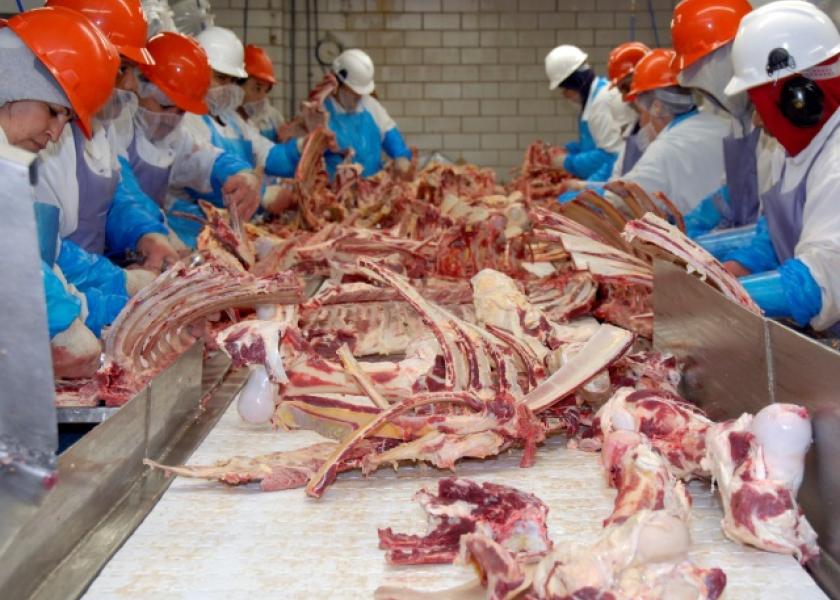Trump Administration Chooses Big Meat Over Little Farmers

After years of fighting for an Obama-era rule that would help farmers sue the mammoth companies they work for, advocacy groups for America’s small poultry, pork and beef growers may have been dealt a final blow by the U.S. Department of Agriculture.
The fight was about whether small farmers can sue if they feel they’ve been mistreated by big companies. Poultry farmers, for example, often get their chicks and feed from big meat producers, which in turn pay the farmer for the full-grown product. If a farmer wants to sue a company for retaliating against him because he complained about his contract—say, by sending him sick chicks or bad feed—the farmer needs to show the company’s actions hurt not only him, but the entire industry.
Under President Obama, that high bar would have been lowered. Under the interim final rule, a showing of harm to only one farmer would suffice to support a claim. The Trump administration last week threw out the Obama-era rule in a move hailed by lobbyists for the big agriculture companies.
“I can’t tell you how disappointed I am,” said Mike Weaver, a West Virginia poultry farmer and president of the Organization for Competitive Markets, who voted for Donald Trump. “Rural America came out and supported the president, and if it weren’t for us, he wouldn’t be where he is now. What they did was wrong, and it shouldn’t have happened that way.”
“This gives the meatpacking industry the ability to do whatever they wish in terms of retaliation against an individual”
Farmer groups—including the National Farmers Union, Rural Advancement Foundation International-USA, Farm Aid, R-CALF USA, the U.S. Cattlemen’s Association, and the Organization for Competitive Markets—supported the Obama-era rule. Many farmers and ranchers thought Trump would allow it to take effect, citing his support for small business and rural Americans. Industry lobbyists, such as the National Cattlemen’s Beef Association, the National Pork Producers Council and the North American Meat Institute, hoped the Republican president would undo the rule, citing fears over increased litigation from farmers. They also thought they’d found a champion for their cause in Trump, who had vowed to cut federal regulation.
“When Trump was coming in with the mantra of reduced regulation,” said Jeremy Scott, a protein research analyst at Mizuho Securities USA LLC, “there was relief.” In the end it was industry, not farmers, that guessed correctly. National Chicken Council President Mike Brown publicly praised the USDA decision.
Meanwhile, farmers and ranchers are left with few options to challenge huge companies over allegedly anti-competitive behavior. “This gives the meatpacking industry the ability to do whatever they wish, in terms of retaliation against an individual,” said Jay Platt, a cow-calf rancher in Arizona, who also voted for Trump. “It leaves the cattle producer absolutely punch-less.”
“He and his minions have now sold these very farmers and ranchers down the river”
“These guidelines would protect farmers and ranchers against bad faith, retaliation, denial of due process and fraud,” said J. Dudley Butler, former administrator of the Grain Inspection, Packers and Stockyards Administration under Obama. “Farmers and ranchers are the backbone of America, and they paved the way for Trump to be president. They thought he was their president, but he and his minions have now sold these very farmers and ranchers down the river.”
In addition to Democrats on Capitol Hill, at least one member of Trump’s own party sees it that way, too. “They’re just pandering to big corporations. They don’t care about family farms,” Senator Chuck Grassley, an Iowa Republican, told reporters upon hearing the news of the USDA decision. “This is an example of a swamp being refilled.”
The National Pork Producers Council disagreed, saying in an emailed statement Wednesday that the proposed rule would have “stifled competition and innovation and, ultimately, raised meat and poultry prices for consumers.” While the NPPC says farmers could still sue in state courts, allegations generally raised in such cases, including antitrust, are largely federal in nature.
Although the Trump administration has faced litigation opposing other attempts to undo Obama-era regulations, lawsuits are unlikely to succeed in upending this latest decision. That’s because the USDA took public comment on the possibility of withdrawing the rule, which itself was based on an interpretation of existing federal law, before doing so.
“If there’s some ambiguity, the agency responsible for carrying out the rule is given deference,” said Cary Coglianese, a law professor at the University of Pennsylvania and director of the Penn Program on Regulation. “It may have been reasonable to interpret the statute the way the Obama administration did, but that doesn’t mean the Trump administration’s isn’t reasonable.”
For now, farmer groups are looking at other avenues. Weaver has sent a letter asking Trump to issue an executive order reversing the USDA’s decision. He still lays part of the blame, however, with the Obama administration, whose rural agenda was largely stymied by Congress.
“Obama had the opportunity to do the right thing, and he didn’t,” said Weaver. “He made a lot of promises to the farmers about the things he was gonna do and never followed through on them.”







